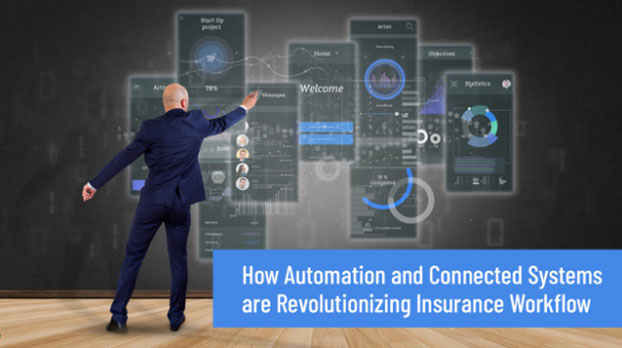How Automation and Connected Systems are Revolutionizing Insurance Workflow
11th July, 2023

In today's rapidly evolving world, automation and connected systems have become catalysts for transformative change across various industries. The insurance sector, in particular, is experiencing a significant impact as these technologies revolutionize its traditional workflow.
The emergence of automation and connected systems has had a profound impact on the insurance industry's workflow. By leveraging automation, insurance businesses can optimize and streamline their operations, eliminating time-consuming manual tasks and improving overall efficiency. Automation in insurance business process management enables seamless integration of data, reduces paperwork, and accelerates decision-making processes, leading to enhanced customer experiences and increased operational agility.
Moreover, connected systems enable smooth collaboration and communication across different departments within an insurance organization. Customer information, policy details, and claims data can now be readily accessible and shared in real-time, empowering employees to make informed decisions quickly and accurately. This interconnectedness enhances customer relationship management, enables personalized services, and supports data-driven decision-making.
The Traditional Insurance Workflow
Traditionally, insurance workflow relied heavily on manual processes, resulting in inefficiencies and delays. Insurance business process automation is changing this landscape by streamlining operations and improving overall efficiency. Tasks such as policy administration, underwriting, and claims processing are being automated, reducing human error and accelerating the entire workflow. By implementing automation in insurance business, companies can achieve better accuracy, faster turnaround times, and improved customer satisfaction.
Automation in Insurance Workflow
Automation has become a game-changer in the insurance industry. From data entry to document management, insurance companies are leveraging automation to optimize their processes. Insurance claims process automation, for example, simplifies and expedites the claims handling process. By automating routine tasks, such as data collection and verification, claims can be processed faster, reducing the time it takes to settle claims. This not only improves customer satisfaction but also enables insurance companies to save costs and allocate resources more efficiently.
Connected Systems and their Role in Insurance Workflow
Connected systems play a crucial role in transforming the insurance workflow. By integrating various systems and processes, insurance companies can enhance collaboration, communication, and data sharing among different departments. This enables real-time access to information, enabling faster decision-making and improved customer service. Customer relationship management systems, data analytics platforms, and fraud detection tools are just a few examples of connected systems that are revolutionizing insurance operations.
The Impact of Automation and Connected Systems on Insurance Workflow
The impact of automation and connected systems on insurance workflow is profound. By automating routine and repetitive tasks, insurance companies can redirect their workforce to focus on more complex and strategic activities. This leads to improved efficiency, reduced operational costs, and increased productivity. Automating the insurance industry also minimizes errors, enhances data accuracy, and improves compliance with regulatory requirements. These factors combined result in faster turnaround times, improved customer satisfaction, and a competitive edge in the market.
Challenges and Considerations
While the benefits of automation in insurance business are evident, there are challenges to overcome. Implementing automation requires careful planning, change management, and training for employees to adapt to new technologies. Data security and privacy concerns must be addressed to ensure the protection of sensitive customer information. Furthermore, ensuring seamless integration and interoperability of various systems is crucial for a smooth workflow.
Future Trends and Outlook
The future of automation in the insurance industry looks promising. Emerging technologies such as artificial intelligence, machine learning, and robotic process automation hold great potential for further revolutionizing insurance workflow. These technologies can enhance data analytics, fraud detection, and customer service, further optimizing the entire insurance value chain. As automation continues to evolve, insurance companies must stay agile and adapt to new trends to remain competitive in the digital era.
Conclusion
Automation and connected systems are transforming the insurance industry, revolutionizing its workflow and redefining customer experience. Insurance business process automation and connected systems have proven their effectiveness in enhancing efficiency, accuracy, and customer satisfaction. As the insurance landscape continues to evolve, companies that embrace automation and connected systems will thrive in this ever-changing industry.
Recent Articles
- How do Big Insurers Engage with the New-Age InsurTech Companies?
- Insurance Management System Integration: Maximizing Efficiency and Performance
- Will Blockchain Technology Reshape the Insurance Market?
- The Future of Health Insurance: Predictive Analytics and AI
- Buy or Build Insurance Software? A Game-Changing Question in Insurance Industry